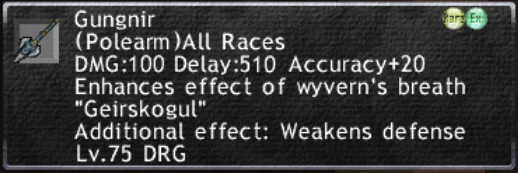Gungnir: Difference between revisions
No edit summary |
(Category was missing) |
||
| Line 49: | Line 49: | ||
==Historical Background== | ==Historical Background== | ||
In Norse mythology, [[Gungnir]] (also Gungni, Gungner, or Gungrir) was the name of [[Odin (NPC)|Odin]]'s javelin. The javelin's name means "Unwavering One" for it always hit its mark. It has the practical characteristic of always hitting the target it was hurled against (which explains why it has +20 accuracy.) According to Snorri Sturluson's Skáldskaparmál, the javelin was fashioned by the dwarves known as the Sons of Ivaldi under the mastery of the blacksmith dwarf Dvalin. It was obtained from the dwarves by Loki as a partial reparation for his theft of Sif's hair. Loki was the person who gave the spear to [[Odin (NPC)|Odin]] in a contest where [[Odin (NPC)|Odin]] was the judge. The war between the Aesir and the Vanir officially started when [[Odin (NPC)|Odin]] threw a javelin over the heads of an assembly of Vanir gods. This was not the Gungnir though. This magical weapon symbolizes the importance of the javelin in the world view of the Norsemen. | In Norse mythology, [[Gungnir]] (also Gungni, Gungner, or Gungrir) was the name of [[Odin (NPC)|Odin]]'s javelin. The javelin's name means "Unwavering One" for it always hit its mark. It has the practical characteristic of always hitting the target it was hurled against (which explains why it has +20 accuracy.) According to Snorri Sturluson's Skáldskaparmál, the javelin was fashioned by the dwarves known as the Sons of Ivaldi under the mastery of the blacksmith dwarf Dvalin. It was obtained from the dwarves by Loki as a partial reparation for his theft of Sif's hair. Loki was the person who gave the spear to [[Odin (NPC)|Odin]] in a contest where [[Odin (NPC)|Odin]] was the judge. The war between the Aesir and the Vanir officially started when [[Odin (NPC)|Odin]] threw a javelin over the heads of an assembly of Vanir gods. This was not the Gungnir though. This magical weapon symbolizes the importance of the javelin in the world view of the Norsemen. | ||
[[Category:Relic Weapons]] | |||
Revision as of 16:24, 5 June 2023
Statistics
"Geirskogul"
Additional effect: Weakens defense
Additional effect: Offensive Wyvern breaths deal unaspected damage
- Attacks will occasionally do 2.5 times normal damage.
Additional effect: Weakens defense
Additional effect: Offensive Wyvern breaths deal unaspected damage
- Defense Down effect is 17%
 . effect matches effect of Angon
. effect matches effect of Angon 
- Aftermath: 5% of damage dealt heals Wyvern
- Geirskogul is now a 2 hit Weapon Skill

- ƒTP is mirrored by all future hits

- Elemental Gorgets are highly effective with mirrored ƒTP Weapon Skill's
- ƒTP is mirrored by all future hits
Augments
Other Uses
| Resale Price: Cannot be sold to NPCs. |
How to Obtain
Cannot be auctioned, traded, bazaared, or delivered. ![]()
Quests
Special Event
Historical Background
In Norse mythology, Gungnir (also Gungni, Gungner, or Gungrir) was the name of Odin's javelin. The javelin's name means "Unwavering One" for it always hit its mark. It has the practical characteristic of always hitting the target it was hurled against (which explains why it has +20 accuracy.) According to Snorri Sturluson's Skáldskaparmál, the javelin was fashioned by the dwarves known as the Sons of Ivaldi under the mastery of the blacksmith dwarf Dvalin. It was obtained from the dwarves by Loki as a partial reparation for his theft of Sif's hair. Loki was the person who gave the spear to Odin in a contest where Odin was the judge. The war between the Aesir and the Vanir officially started when Odin threw a javelin over the heads of an assembly of Vanir gods. This was not the Gungnir though. This magical weapon symbolizes the importance of the javelin in the world view of the Norsemen.


